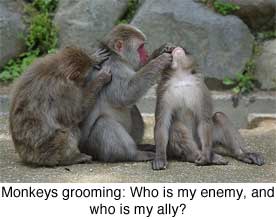 There is a gossip-y connection between the history of the internet and the history of human speech. I was reminded of this by reports last year on the amazing growth of social networks, particularly Facebook.
There is a gossip-y connection between the history of the internet and the history of human speech. I was reminded of this by reports last year on the amazing growth of social networks, particularly Facebook.
It was generally assumed that human’s started talking in order to share information. Factual information. Stuff like, “I saw a bear, don’t go over there.” or “Let me show you how to make this new thing that I call ‘Fire'”.
Primatologist Robin Dunbar challenged this notion[1] by asserting that gossip was the primary use case of language; the “killer app”, so to say. If you’re living in a social group with a lot of members, the most useful information you can exchange is about those other members. Knowledge of bears and fires takes a backseat to knowledge of enemies and lovers. Non-human primates share this information by grooming each other. We humans do it by gossiping. In his research, he found that “two thirds of conversation time is devoted to social topics, most of which can be given the generic label gossip.“
Note that he’s using “gossip” in a wide sense; including assurances of friendship, “catching up” on people’s lives.
 Similarly, the web was originally conceived as a place where scientists could exchange scholarly papers. And it was that way, at first. But the arcane worlds of usenet and IRC, geeks were already gossiping away by the 80’s. And now, with the rise of the “Social” buzzword, you the volume of gossip online is coming to match the volume offline in speech. Americans now spend 23% of all internet time on social networks. And if you count the time that people spend texting and the non-business emails, it’s clear the total gossip-usage of the internet is much higher.
Similarly, the web was originally conceived as a place where scientists could exchange scholarly papers. And it was that way, at first. But the arcane worlds of usenet and IRC, geeks were already gossiping away by the 80’s. And now, with the rise of the “Social” buzzword, you the volume of gossip online is coming to match the volume offline in speech. Americans now spend 23% of all internet time on social networks. And if you count the time that people spend texting and the non-business emails, it’s clear the total gossip-usage of the internet is much higher.
Social networks are the natural evolution of talking. No wonder no one calls anymore!
Absolutely interesting! I never considered that even dating back to prehistoric times that survival would depend more on being able to manipulate the people around you rather than the environment around you.
“Manipulate” is a strong word, but I’d have to agree. Humans, like any social creature, have to work in both the *physical* environment and *social* environment. And as technology has relieved most of the pressures of the physical world (i.e. raw survival is relatively easy in the modern world), working in the social environment has become even more important.
Check out my latest post which follows this theme, looking at Facebook and social media:
http://wanderingstan.com/2012-05-04/facebooks-andrew-boz-bosworth-and-the-evolution-of-human-relationships